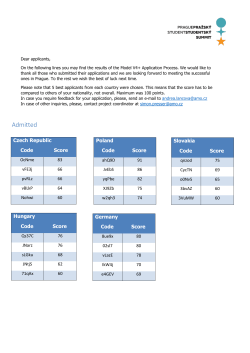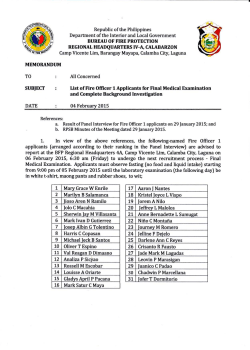
Amendment to Housing Allocation Scheme
London Borough of Hammersmith & Fulham
CABINET
30 MARCH 2015
AMENDMENT TO HOUSING ALLOCATION SCHEME FOLLOWING THE COURT
OF APPEAL JUDGMENT IN R (JAKIMAVICUITE) V LB HAMMERSMITH & FULHAM
Report of Councillor Lisa Homan: Cabinet Member for Housing
Open report
Classification - For Decision
Key Decision: Yes
Wards Affected: All
Accountable Executive Director: Melbourne Barrett – Executive Director for Housing
and Regeneration
Report Author: Mike England - Director for Housing
Options, Skills & Economic Development
1.
Contact Details:
Tel: 020 8753 5344
E-mail:
mike.england@lbhf.gov.uk
EXECUTIVE SUMMARY
1.1
The Council‟s current scheme Housing Allocation Scheme was approved
by the Council‟s previous administration in December 2012. The purpose of
this report is to allow the current administration to revise the scheme
following the Court of Appeal Judgment in R (Jakimavicuite) v LB
Hammersmith & Fulham which found a part of it to be unlawful.
1.2
This judgment has ruled a specific element of the Housing Allocation
Scheme (described in Section 5.1 below) is unlawful and this must be
remedied by the Council.
1.3
Officers do not consider it advisable to delay a revision to the Housing
Allocation Scheme (December 2012) to reflect the Court of Appeal
judgment until a wider review of the Housing Allocation Scheme is
completed later in 2015.
1
2.
RECOMMENDATIONS
2.1
That the Housing Allocation Scheme adopted by the previous Council
administration in December 2012 be amended to delete paragraph Section
2.14(d).
2.2
That any associated transitional costs arising from implementing the
change to the Scheme be funded from an existing approved earmarked
reserve set aside for this purpose.
3.
REASONS FOR DECISION
3.1. The reason for the decision is to comply with the judgment of the Court of
Appeal.
4.
INTRODUCTION AND BACKGROUND
4.1
The Council is statutorily obliged to adopt and operate a Housing Allocation
Scheme (also known as the „Scheme of Allocation‟) which sets out the rules
by which it allocates available affordable rented accommodation. The
current Housing Allocation Scheme was adopted by the previous council
administration in December 2012 and implemented from April 2013.
4.2
The Housing Allocation Scheme will be the subject of a review later in 2015
and an initial consultation process, as part of the broader housing strategy
revision process, began on 6 January 2015. Cabinet will be asked to adopt
a final Housing Strategy document on 19 May 2015, with a final Housing
Allocation Scheme adopted later in the year.
5.
PROPOSAL AND ISSUE
5.1. Section 2.14 of the Housing Allocation Scheme (December 2012) includes
classes of persons who do not normally qualify for inclusion on the housing
register. The proposal is to delete paragraph Section 2.14(d) which reads
as follows:
“Section 2.14 (d) – Homeless applicants placed in long term suitable
temporary accommodation under the main homelessness duty, unless the
property does not meet the needs of the household or is about to be ended
through no fault of the applicant. Long term temporary accommodation can
include the private sector homes let via the council or a housing association
under a leasing arrangement, and non-secure tenancies on regeneration
estates.”
5.2
As set out above the Council has a statutory obligation to adopt and
operate a Housing Allocation scheme and it is also required to give
2
„reasonable preference‟ to certain classes of applicant in defined needs
groups. Households who are owed the statutory duty to accommodate
under homelessness legislation ("the full homelessness duty") are one of
the defined reasonable preference groups.
5.3
Previous case law has established that the duty to give a reasonable
preference to the defined groups does not amount to an individual right that
applies to any member of that group. Rather the duty is owed to the group
as a whole and the requirement is that overall the scheme must give
preference to applicants from within those groups over applicants from
outside of those groups. In the Jakimavicuite case the applicant who
brought the claim argued that 2.14(d) breached the Council‟s duty to give
reasonable preference to applicants owed the full homeless duty and, that
in effect, the Council had pushed the power to set qualification criteria
farther than the law allowed.
5.4
The power to set qualification criteria was established by the 2011 Localism
Act. Where local authorities exercised that power, the potential for a
„tension‟ between exercising that power and the duty to give reasonable
preference to certain groups was created. This tension was the issue
before the court. The Court of Appeal held that it was not open to the
council to use the power to set qualification criteria to 'carve out' a sub
group of applicants from within the reasonable preference groups who
could then be disqualified on the basis of lesser need. Consequently it held
that section 2.14 (d) of the scheme was unlawful.
5.5
The Council is required to amend its Housing Allocation Scheme to comply
with the judgment. It should be noted that the judgment did not quash the
scheme, but simply declared 2.14(d) to be unlawful.
5.6
The Council‟s draft new Housing Strategy, currently out to consultation,
seeks views on a range of possible amendments to the Allocation Scheme.
Once comments have been received, members will wish then to consider
whether to proceed with further amendments. However, this will take longer
than what might be seen as a reasonable period for the council to respond
to the court judgement. A two-stage approach is therefore proposed. Stage
one will be focused on achieving specific compliance with the requirements
of the court‟s judgment and stage two with the wider changes.
5.7
Once they have authority to amend the Allocation Scheme officers will
begin the process of approaching applicants and reinstating them to the
Housing Register. In the first instance, applicants are likely to be placed in
Band 3 of the Housing Register. Some may be placed in Band 2 (i.e.,
where the applicant meets the community contribution criteria). Applicants
who do not meet the five year residence criteria will however continue to
have reduced priority and will be placed in band 4 until such time as the
residence criteria are satisfied. Each applicant‟s circumstances will need
to be considered and banding will be awarded accordingly. It is anticipated
that around 800 applicants will be added to the Housing Register. This will
have a „knock on‟ impact on waiting times for the other c 850 applicants
3
currently on the Register. Once the re-instatement process is fully
complete, officers can then begin measuring the impact of the amendment
to the housing allocation scheme.
6.
OPTIONS AND ANALYSIS OF OPTIONS
6.1
In the absence of an appeal to the Supreme Court there are no options
available to the Council other than to comply with the judgement.
7.
CONSULTATION
7.1.
The Council is statutorily obliged to consult with Registered Providers (i.e.,
housing associations) when making major amendments to its Housing
Allocation Scheme. Officers have informed members of the H&F Housing
Association Forum (the consultative forum for the council and housing
associations) of the Council‟s intention to make the change necessary
described in section 2.1 and sought comments accordingly. The scope to
influence the Court of Appeal‟s judgment is considered to be very limited
but Registered Providers may be able to assist in advising how the change
in the Housing Allocation Scheme can be most effectively implemented.
8.
EQUALITY IMPLICATIONS
8.1.
The equality implications of reinstating homeless applicants living in
temporary accommodation to the Housing Register are expected to be
broadly positive. Given applicants who present themselves as homeless
are more likely to be from black, Asian and minority ethnic backgrounds;
women; young people; then the impacts can be expected to be positive.
By reinstating the c.800 former applicants to the housing register, this will
have „knock on‟ impacts, e.g., longer waiting times, on those already on
the housing register, many of whom will also be from protected equality
groups.
8.2.
Implications completed by: Aaron Cahill, Interim Housing Strategy
Manager 0208 753 1649
9.
LEGAL IMPLICATIONS
9.1
The legal implications of this decision are contained within the report.
Failure to amend the Scheme of Allocation would expose the Council to
further legal challenges. This is an interim change to ensure that the
Council operates lawfully pending a wider review of the Scheme.
9.2
Implications completed by: Janette Mullins, Principal Solicitor
and Litigation) 020 8753 2744.
4
(Housing
10.
FINANCIAL AND RESOURCES IMPLICATIONS
10.1
It is anticipated that there will be a one-off cost associated with
implementing the amendment to the Scheme of Allocation. These
transitional costs are not expected to exceed £25k and relate mainly to the
costs of systems changes, administration and communication costs arising
from reinstating c.800 former applicants to the housing register.
10.2
There are no significant ongoing financial implications resulting from the
amendment to the Scheme. The Housing Allocations service will continue
to be sufficiently funded from existing resources.
10.3
It is recommended that the additional one-off costs of up to £25k are
funded from the existing approved reserve held by Housing &
Regeneration which was established specifically to provide for the one-off
costs associated with the review of the Housing Register and the Housing
Allocation Scheme.
10.4
Implications completed by: Kathleen Corbett, Director of Finance and
Resources, 020 8753 3031.
11.
RISK MANAGEMENT
11.1
Following the Court of Appeal judgement, the proposed amendment must
be made to the Housing Allocation Scheme. Inaction on the council‟s part
exposes the council to the risk of a further legal challenge. Compliance
with Legal Duty is a Corporate risk and is noted as risk number 8 on the
council‟s risk register.
11.2
Implications completed by: Michael
Manager Telephone: 0208 753 2587.
12.
PROCUREMENT AND IT STRATEGY IMPLICATIONS
12.1
There are no procurement related implications contained in the report.
12.2
Implications verified by: Robert Hillman, Procurement Consultant (HRD),
x1538
Sloniowski,
BiBorough
Risk
LOCAL GOVERNMENT ACT 2000
LIST OF BACKGROUND PAPERS USED IN PREPARING THIS REPORT
No.
Description of
Background Papers
1.
No unpublished papers
Name/Ext
file/copy
5
of holder of Department/
Location
© Copyright 2025










